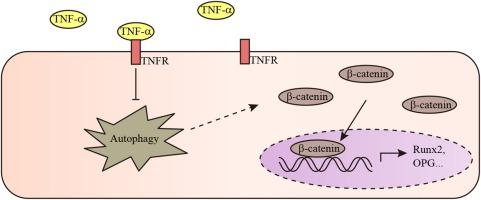Tissue & Cell ( IF 2.7 ) Pub Date : 2020-06-29 , DOI: 10.1016/j.tice.2020.101401 Lili Chen 1 , Jiaqi Bao 2 , Yuting Yang 1 , Zhongxiu Wang 1 , Mengjiao Xia 1 , Jingyi Tan 1 , Lili Zhou 1 , Yanmin Wu 1 , Weilian Sun 1

|
Periodontitis is an inflammatory disease with a high incidence characterized by irreversible destruction of alveolar bone. This study aimed to investigate the effect of tumor necrosis factor-α (TNF-α) on osteogenic differentiation and its molecular mechanism. TNF-α inhibited osteogenic differentiation as revealed by the lower accumulation of osteoblastic genes like runt-related transcription factor (Runx2), alkaline phosphatase (ALP), osteoprotegerin (OPG), and osteocalcin (OCN). Moreover, TNF-α down-regulated the expressions of LC3II, ATG7, and beclin 1 (BECN1); suggesting that autophagy was inhibited during the process of osteogenic differentiation. Consistently, Wnt/β-catenin signaling pathway members such as low-density lipoprotein receptor-related protein 5 (LRP5), β-catenin, and phosphorylated-β-catenin (p-β-catenin) were reduced by TNF-α. Furthermore, the inhibitory effect of TNF-α on osteogenic differentiation and the Wnt/β-catenin signaling pathway could be abated by autophagy inducers but exacerbated by autophagy inhibitors. The most intriguing finding of all was that TNF-α inhibited osteoblastic differentiation and the Wnt/β-catenin signaling pathway by down-regulating autophagy, and autophagy positively regulated the Wnt/β-catenin pathway and thus influenced osteoblastic differentiation. Our study provides a theoretical basis for autophagy-inducer therapy for the alveolar bone loss caused by periodontitis.
中文翻译:

自噬通过 Wnt/β-catenin 通路参与肿瘤坏死因子-α 抑制小鼠颅骨成骨细胞的成骨分化。
牙周炎是一种以牙槽骨不可逆破坏为特征的高发炎性疾病。本研究旨在探讨肿瘤坏死因子-α(TNF-α)对成骨分化的影响及其分子机制。TNF-α 抑制成骨分化,如矮小相关转录因子 (Runx2)、碱性磷酸酶 (ALP)、骨保护素 (OPG) 和骨钙素 (OCN) 等成骨细胞基因的积累较少。此外,TNF-α 下调 LC3II、ATG7 和 beclin 1 (BECN1) 的表达;表明自噬在成骨分化过程中受到抑制。一致地,Wnt/β-catenin 信号通路成员如低密度脂蛋白受体相关蛋白 5 (LRP5)、β-catenin 和磷酸化-β-catenin (p-β-catenin) 被 TNF-α 减少。此外,TNF-α对成骨分化和Wnt/β-catenin信号通路的抑制作用可被自噬诱导剂减弱但被自噬抑制剂加剧。最有趣的发现是TNF-α通过下调自噬抑制成骨细胞分化和Wnt/β-catenin信号通路,而自噬正向调节Wnt/β-catenin通路从而影响成骨细胞分化。我们的研究为自噬诱导剂治疗牙周炎引起的牙槽骨丢失提供了理论依据。其中最有趣的发现是 TNF-α 通过下调自噬抑制成骨细胞分化和 Wnt/β-catenin 信号通路,而自噬正向调节 Wnt/β-catenin 通路,从而影响成骨细胞分化。我们的研究为自噬诱导剂治疗牙周炎引起的牙槽骨丢失提供了理论依据。其中最有趣的发现是 TNF-α 通过下调自噬抑制成骨细胞分化和 Wnt/β-catenin 信号通路,而自噬正向调节 Wnt/β-catenin 通路,从而影响成骨细胞分化。我们的研究为自噬诱导剂治疗牙周炎引起的牙槽骨丢失提供了理论依据。











































 京公网安备 11010802027423号
京公网安备 11010802027423号